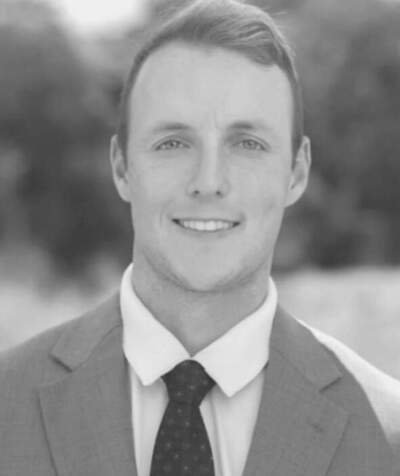Commentary
Shame can’t have more power than love

Editor's note: A version of this essay originally appeared in WBUR's CommonHealth newsletter. You can subscribe to that newsletter here.
One year ago this month, police found the body of my nephew on the front seat of a borrowed car in a gas station parking lot. Austen Smith was 29. He'd been addicted to pain pills, on and off, for more than 10 years. On some level, Austen knew the risk he was taking in those wee morning hours, but opioids had hijacked his brain. This time there was enough fentanyl in whatever Austen took to kill him.
The risk-taking piece is no surprise. Austen always pushed for more out of life. As a tike, he’d be the first into the deep end of the pool or off the diving board or down the water slide — backwards. On hikes Austen went straight up the mountain, if possible. It was Austen who pulled the cousins away from screens for a fishing trip or game of football. In his late teens, Austen started using pain pills to relieve the distress of Crohn’s disease. Sometime in his early 20s he got addicted.
In 2018, Austen went into treatment and did not use drugs for several years. He finished law school and worked for several firms, successfully arguing one federal appeals court case. But about a year before he died, my sister told me Austen was using again. Maybe it was to relieve stress — or maybe to cope with that insatiable urge to get more out of each day.

I don't know. I didn't ask.
Although I knew Austen struggled with addiction — and visited him in treatment — I almost never asked him about his experience of the disease, or his recovery. I asked about Crohn's disease, Austen's other chronic condition, the one that launched his attachment to opioids. "How's the pain?" I would ask. "Are any of the meds helping? How much do they cost? Did you read that study I sent you? What are you doing about your diet?" Austen loved to share his latest healthy eating tips. I’m a health reporter. I listened, learned some things and occasionally pushed back when Austen claimed he’d found a miracle cure.
But I never asked about the disease that killed my dear, dear Austen. Me, the reporter who has written or said the words "shame kills" so many times in stories and conversations about addiction. In grief, I’ve found myself asking, why did I let shame get between me and my lovable bundle of energy, curiosity and joy?
I wasn't ashamed of Austen — not in any way — I'm sure of that. But I didn't want him to think I was ashamed of him. So, I didn't bring up this condition because other people call it shameful. I did the same thing with Austen's sister and brothers. We talked a little bit about how Austen was doing but not in any depth, because I assumed they would be embarrassed. I didn’t ask my niece or other nephews how they were coping with the stress of Austen’s addiction, if they had any ideas about how I could help — or if they were scared. I gave in to the fear of shame. I will regret this to my last breath.
It's stunning that it took the death of someone I love dearly to show me how deeply fear and shame are embedded in the way we treat people with an addiction.
I have no idea whether frank, open conversations might have made a difference in Austen's life. What if I'd asked: "Are you OK? Do you feel safe? What can I do to help?" Or even: "Will you please call me if you're ever using alone, so I can call 911 if you stop responding?" Austen died alone, across the street from a hospital. I am ashamed that I didn't ask Austen these questions.
I still collapse sometimes, sobbing, begging Austen, or God, or someone, for another chance. That's irrational, of course, but my heart isn't ready to listen to reason.
It's stunning that it took the death of someone I love dearly to show me how deeply fear and shame are embedded in the way we treat people with an addiction. I knew this. And yet I still couldn’t see how shame was controlling my conversations with Austen. The blinders were too big, until it was too late.
What I can do now is banish shame. It's useless, dangerous and destructive. I can pledge to Austen that I will never be guided by it again.
I wish I could tell Austen. I want to see his face transform with that dimpled smile. He’d be so happy that I am trying to fix my mistakes. In many ways, he was already way ahead of me.
Follow Cog on Facebook and Instagram. And sign up for our weekly newsletter.
